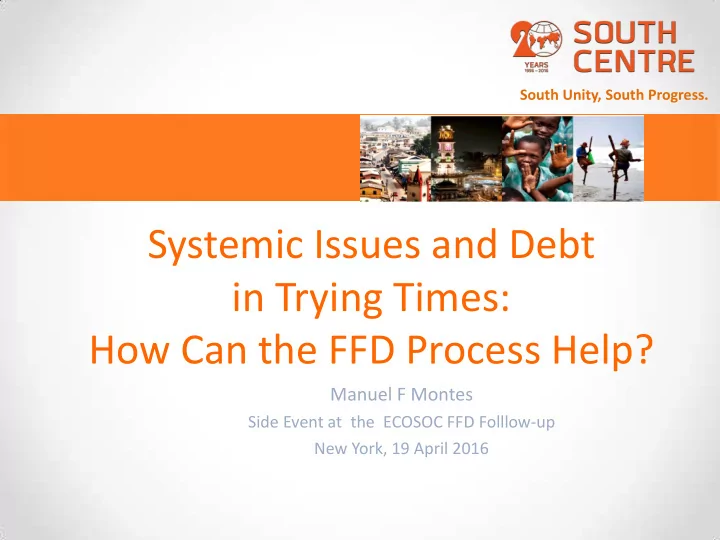

South Unity, South Progress. Systemic Issues and Debt in Trying Times: How Can the FFD Process Help? Manuel F Montes Side Event at the ECOSOC FFD Folllow-up New York, 19 April 2016
Episodic Capital Flows – ca 2010 SC 2 Akyuz 2011 updated South Unity, South Progress.
Episodic Capital Flows – Apr 2016 IMF • International o Policy Space 3 Soutce: Figure 2.1 IMF 2016, WEO Apr 2016 South Unity, South Progress.
IMF WEO April 2016, p. 64 4 South Unity, South Progress.
IMF Discovery of Episodic K-Flows • Figure 2.1 WEO April 2016 p. 64 • Reference for figure - Catao & Milesi-Ferreti 2014, J. of Intl. Econ. 2014 : Vertical Bars • No other references. NO REFERENCE to Akyuz in WEO or in Catao & Milesi-Ferreti 2014 • IMF discovery 2016-2011=5 years late • In the meantime, developing countries increased external debt and have reduced policy space 5 South Unity, South Progress.
Implications of Episodic Flows • If international liquidity episodic, then debtor countries NOT completely in control when o Their international liabilities increase o When commodity prices are rising o When their external debt problems will begin • There is a SYSTEMIC basis for external payments booms and busts and requires explanations beyond the “Rise of the South” 6 South Unity, South Progress.
Competing Stories ca 2011-12 IMF Others (including South Centre, UNCTAD) High Growth in Developing High Growth in developing Countries – world, Abundant global DECOUPLING liquidity, high commodity Developing Countries Grow prices Despite Great Recession in EPISODIC - North Atlantic economies Eventual reversal of flows (Rise of ‘the’ South) Increased capital flows come Increased capital flows to from increased liquidity created developing countries by Quantitative Easing , which FRUIT of earlier structural will have to be normalized in reforms (provable?) the future 7 South Unity, South Progress.
Competing Stories ca 2011-12 IMF Others (including South Centre, UNCTAD ) Austerity (public sector Fiscal spending required in expenditure reductions) North. required in developed and Quantitative easing should be developing countries to reverse ended because it is causing increase in public indebtedness. “currency wars” and currency Capital controls only for BOP appreciation in developing crises countries. Capital controls needed both in boom and bust. Outcomes: Successive IMF Danger of developing country downgrades of potential private sector indebtedness output; Global trade collapses Reversal of commodity price Now: Secular stagnation and trends; Global trade collapses danger of “Too Slow for Too SDR allocation to provide Long” WEO April 2016 liquidity 8 South Unity, South Progress.
Unaddressed systemic issues • Dependence on US dollar; global economy hostage to booms and busts in US political cycle -> increased use of SDRs • Disciplines on reserve issuing economies o Beggar thy neighbor & limits of QE • SDG 10.5 Strengthened financial regulation, especially regulation in financial centres • If there is a systemic cause, then need for intl debt workout system (good governance and rule of law) • Voice and participation of developing countries 9 South Unity, South Progress.
Role of FFD follow-up process • Address unresolved global economic crisis (“trying times”) • Highlight alternative views and alternative policy proposals • Acknowledge the EXISTENCE of systemic issues (crises not only due to proclivity for bad policy of individual countries) • Forum for early warning and concerted action and response 10 South Unity, South Progress.
Thank you montes@southcentre.int www.southcentre.int Tel: +41 22 791 80 50 Fax: +41 22 798 85 31 South Centre Chemin du Champ d'Anier 17 C.P. 228 1211 Geneva 19 Switzerland 11 South Unity, South Progress.
Recommend
More recommend